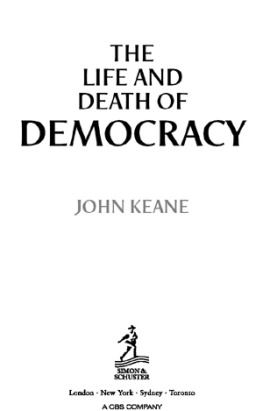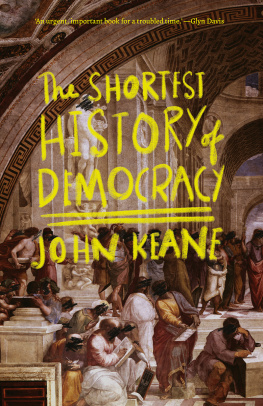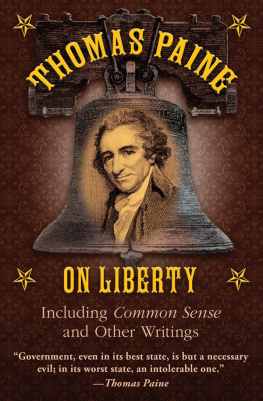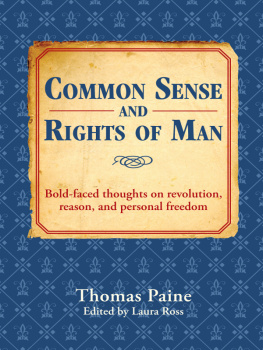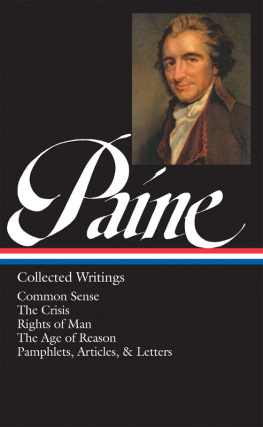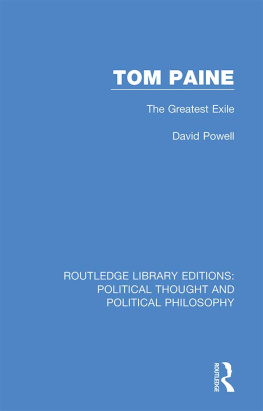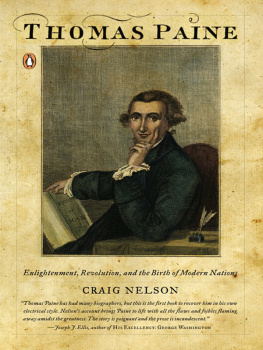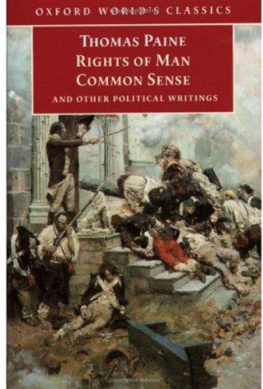TOM PAINE
A Political life
BY THE SAME AUTHOR
Public Life and Late Capitalism
Democracy and Civil Society
The Media and Democracy
TOM PAINE
A Political life
JOHN KEANE

Copyright 1995 by John Keane
All rights reserved. No part of this book may be reproduced in any form or by any electronic or mechanical means, including information storage and retrieval systems, without permission in writing from the publisher, except by a reviewer, who may quote brief passages in a review. Any members of educational institutions wishing to photocopy part or all of the work for classroom use, or publishers who would like to obtain permission to include the work in an anthology, should send their inquiries to Grove/Atlantic, Inc., 841 Broadway, New York, NY 10003.
First published in Great Britain in 1995 by
Bloomsbury Publishing Plc, London, England
Printed in the United States of America
Library of Congress Cataloging-in-Publication Data
Keane, John, 1949
Tom Paine : a political life / John Keane.
p. cm.
Originally published: London : Bloomsbury, 1995.
Includes bibliographical references and index.
eBook ISBN-13: 978-0-8021-9953-9
1. Paine, Thomas, 1737-1809. 2. Political scientists United States Biography. 3. Revolutionaries United States Biography.
I. Title.
JC178.V5 K43 2003
320.51092dc21
[B] 2002029961
Grove Press
841 Broadway
New York, NY 10003
For Alice
George
Leo
Rebecca
Contents
Prologue
A Citizen Extraordinary
IF ONE PURPOSE of biography is to lift individuals out of time and confer upon them a form of immortality, then the Englishman Tom Paine (17371809) is a natural ally of the art of preserving lives in words. More than any other public figure of the eighteenth century, Paine strikes our times like a trumpet blast from a distant world. His writings still spark disputes about matters of public importance, while his thoughts move public figures as different as Ronald Reagan and Bob Dylan, Salman Rushdie and Margaret Thatcher to quote him as if to prove that the dead are sometimes more alive than the living.
Paines uncanny familiarity is partly traceable to his own stupendous achievements. Despite humble beginnings, Paines every step later generated intense public excitement. Paine reckoned that life was either a daring adventure or nothing, and for that conviction many loathed him. The dominant classes, pickled in port and privilege, certainly thought him rough and ungracious, an upstart in their world of landed wealth and courtly power. But among enemies and friends alike, Paine earned a reputation as a citizen extraordinary as the greatest political figure of his generation.
Paine burst onto the stage of public life as a commoner. In his early years in England, he was variously employed as a corsetmaker, a ships hand, a Methodist lay preacher, an exciseman, a teacher of English, and a writer who dabbled in public affairs. Fortune soon flung him twice into the furnace of revolution. In America, he served as a soldier, political adviser, and war correspondent. He was also the most prominent political thinker and writer during the Revolutionary struggle against the British. He was twice invited to France, where he helped draft the 1793 constitution. During the Reign of Terror, after having argued for abolishing the monarchy and preserving the life of Louis XVI, he spent nearly a year in prison, where he almost died of exhaustion and narrowly escaped the guillotine. At every turn, Paines life was packed with excitement, drama, surprises, and some remarkable failures. His writings shocked and thrilled audiences not only in England, America, and France but also in towns as different as Dublin and Dubrovnik, Philadelphia and Warsaw, Berlin and Santo Domingo. In each place, he forged a reputation as the worlds chief public defender of republican democracy a living symbol of the modern fight for the rights of citizens against warring states and arbitrary governments, social injustice and bigotry.
These leitmotivs of Paines life and writings obviously bind our world to his. But he is also so strikingly one of us in the thoroughly modern language he used to express himself. Eighteenth-century English prose, by contrast with its predecessors, feels surprisingly crisp. Although certain words, phrases, and sentence constructions from that period are not normally used today, eighteenth-century writing essays, novels, pamphlets, journals, treatises has for us a definite familiarity, as if that language and our own coexist within the boundaries of modern English.
Paines own writing, encouraged by his reading the works of figures such as Daniel Defoe and Jonathan Swift, helped produce this familiarity. The brilliance of his quill made him a literary lion, a master of daring assertion, sly humor, and witty metaphor. Not only the message but also the modernist style of Common Sense, Rights of Man, and. The Age of Reason ensured that they became the three most widely read political tracts of the eighteenth century. Their concerns still unsettle readers in our time, in no small measure because Paine, a grand master of modern prose, helped effect a revolution in political language. His books, pamphlets, letters, essays, and poetry tried to communicate complications simply. They invented a plain style crafted to capture the attention, and secure the trust, of audiences previously accustomed to being pushed about or ignored, not being written for, talked about, and taken seriously as active citizens. As it is my design to make those that can scarcely read understand, Paine wrote, I shall therefore avoid every literary ornament and put it in language as plain as the alphabet.
And so he usually did. Full of fire, Paine hammered out lean, lightning-quick sentences for audiences he knew well self-educated artisans and ordinary folk like himself, for whom reading and being read to were exhilarating first-time experiences. For such folk, reading Tommy Pain must have resembled walking into previously unimagined political territory. In Paines prose, they followed a confident guide, convinced that his footsteps were echoing across a landscape that no one had ever trodden before, let alone mapped. Paine described that new world of republican democracy with immense wit and seriousness. He supposed that in politics words count and that words are deeds. He further supposed that liberty is connected with prose and that people unfriendly to citizens liberty normally wrap their power in pompous or meaningless phrases.
Paine certainly had no elaborate theory of language, and he rarely questioned his own conceited view that his writing was plain truth, a reflection of the world as it actually is. He counted himself among the modern believers in the originally Greek idea that what makes us clever, language-using animals is our ability to rise above the contingencies of time and place and know the nature of things. Paine nevertheless pointed to modern humans bad habit of forgetting those same circumstances. We moderns continually attribute universal importance to our own particular ways of life and we therefore have an alarming tendency to boss ourselves and others, using sticks and stones and bigoted words, into accepting our preferred version of the world. Paine despised bossing, and he had a fine ear for language masquerading as Truth. Bastilles of the word was Paines phrase for needlessly haughty language, and he consequently wrote as if it were the duty of the citizen, and certainly the political thinker and writer, to be on the lookout for hubris. He prodded and poked at it wherever it appeared, his overall aim being to encourage individuals to become citizens capable of thinking, speaking, and acting clearly and confidently in public. Here Paines didacticism dovetailed with his wider concern to take the ax to dictators and hierophants. Paine felt enormous compassion for the unjustly treated, and he despised haughty powermongers who put themselves beyond question. Paine so disliked arrogance and venality that he not only championed citizens right to tell others what they do not want to hear. He also was prompted to show that human beings could live together on earth without earthly Gods indeed, that we live fully only in their absence.
Next page

